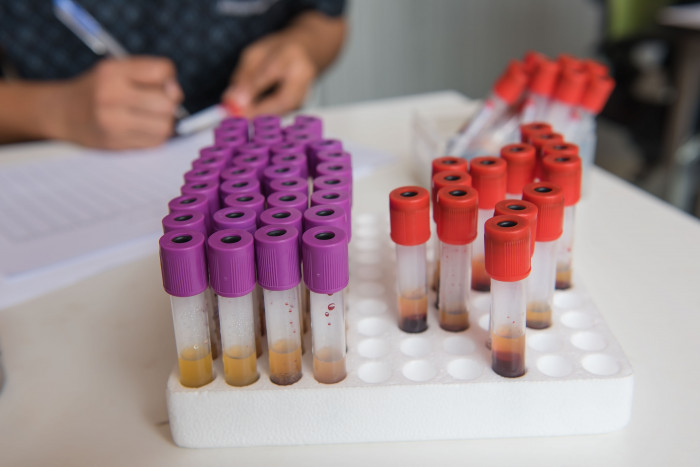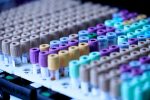The Unseen Stress of Lab Visits
Written by |

oatautta/Shutterstock
Today is Lab Day. It’s been highlighted on my calendar for weeks, two words, stern and unavoidable.
On the surface, it’s only a quick task: Show up, give samples, leave. But realistically, these visits demand a lot of my mental and physical energy due to the myriad little details.
My Google calendar is color-coded by date, physician, and test type. That makes it easier to give the schedule a perfunctory glance and quickly assess what needs to be done.
These days, having been in remission from granulomatosis with polyangiitis for many years, I’m only required to complete one urinalysis every eight weeks and a blood sample every 12 weeks. It used to be far more frequent, so I’m grateful for this new leniency from my rheumatologist. She trusts that we can work together and determine my health situation based on how I feel. As long as the labs don’t show anything unusual, we can proceed as if there is no flare.
I shower immediately before leaving the house to ensure uncontaminated skin. Past lab results have shown trace amounts of bacteria, so it’s good to rule that out when it’s within my control. I also drink tea nonstop all morning. The urine sample needs to be just right, including the timing, the amount, and the ability to provide a useful specimen on demand.
Blood day is different. I have a tendency to pass out, so I bring fruit juice to sip.
But what will I do if the office is busy and there’s time to kill? I need to have a book, game, or word puzzles ready. (In anticipation of this, one local doctor’s office has a fun “take one, leave one” bookshelf in the lobby.)
Lab days also invoke hidden costs everywhere. I may need a pick-me-up, like coffee or a snack. If I go downtown, I have to pay parking fees and navigate the facility. The devil is always in the details.
Both procedures together take 10 minutes, and neither is invasive or more than mildly painful. Blood draws have become customary over the years. The issues that make most people squeamish — like needle pricks, bodily fluids, or bones breaking — don’t bother me much. My frame of mind is that it’s just biology.
I’ve learned about different types of needles, and the one that works best in my veins is the butterfly. I can even joke, with some truth, that if I needed to draw my own blood, I probably could. But the pinch never gets any less irritating for my arm. It’s worse than usual if the phlebotomist can’t find a good vein right away.
Afterward, I feel weak and fatigued, either from the psychological strain or the actual blood loss. Sometimes I’ll clear my schedule ahead of time so I can simply go home and rest for the remainder of the day.
Several days could pass before I hear back from my doctor. Reports usually indicate “no sign of vasculitis activity” to signal I am still in remission. But if my doctor sees something suspicious in my blood or urine, I may need to get more lab tests done the following week.
Sometimes, the phlebotomist has accidentally discarded — and even lost — my sample, which meant I had to return to do it all over again.
Reading over the biomarkers in lab results can take a while, but it helps me learn what to watch out for. Familiarity with my body is incredibly empowering. I have a heightened awareness of my physical profile, and what does or doesn’t feel right. That means that when things go wrong in the bloodwork, I can rely more on my own assessment of my health, and not have to fully rely on what the test numbers say.
The details to keep track of don’t end when I exit the building. As with any healthcare scenario, the insurance paperwork follows. Whatever I didn’t pay at the appointment is billed to me — a tangled web of finances most of us know too well.
Trips to the lab have consumed a staggering amount of my time and attention over the years. The little things add up. Of course, the flip side of this hassle is that I am healthy. There is no substitute for assessing how my body feels and being able to corroborate that with specific numbers.
I can’t control my autoimmune disorder. But I can control some nuances of the lab lifestyle, which makes me more comfortable, confident, and optimistic. And doing so makes it easier to accept that I’ll probably go through this routine for the rest of my life.
***
Note: ANCA Vasculitis News is strictly a news and information website about the disease. It does not provide medical advice, diagnosis, or treatment. This content is not intended to be a substitute for professional medical advice, diagnosis, or treatment. Always seek the advice of your physician or other qualified health provider with any questions you may have regarding a medical condition. Never disregard professional medical advice or delay in seeking it because of something you have read on this website. The opinions expressed in this column are not those of ANCA Vasculitis News or its parent company, Bionews, and are intended to spark discussion about issues pertaining to ANCA vasculitis.







May
Who is your doctor🥺,been looking desperately for a good knowledgeable doctor for my 31 year old daughter in houston and 2 yrs have passed, 3 doctors later, still no remission.